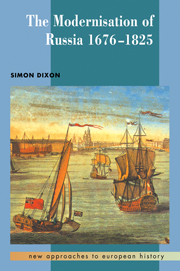3 - Finance and taxation
Published online by Cambridge University Press: 05 June 2012
Summary
‘If there is one thing about kings’, remarked Sir John Hicks in a masterly essay on the finances of the sovereign, ‘it is that more often than not they were hard up.’ As we shall see, the Russian crown's fiscal embarrassment owed most to the rising costs of international rivalry, which, as elsewhere in Europe, surpassed the resources provided by impoverished agrarian economies and by populations resentful of the imposition of regular taxation. It was long commonplace to rank the former obstacle as the more daunting. ‘No king can be rich, nor glorious, nor secure’, warned Hobbes in Leviathan (1651), ‘whose Subjects are either poore, or contemptible, or too weak through want, or dissention, to maintain a war against their enemies.’ A century or so later, Quesnay emphatically concurred: ‘POOR PEASANTS, A POOR KINGDOM’. Historians once echoed this sentiment. But their observation that economic progress offered no guarantee of increased revenue has recently persuaded them to focus instead on attempts to establish flexible ways of tapping existing wealth. This chapter follows their example.
Muscovite taxation
What little we know about Muscovite finances can be thrown into relief by comparisons with Britain and France, where, in different ways, money became a crucial political and constitutional issue.
- Type
- Chapter
- Information
- The Modernisation of Russia, 1676–1825 , pp. 57 - 79Publisher: Cambridge University PressPrint publication year: 1999

